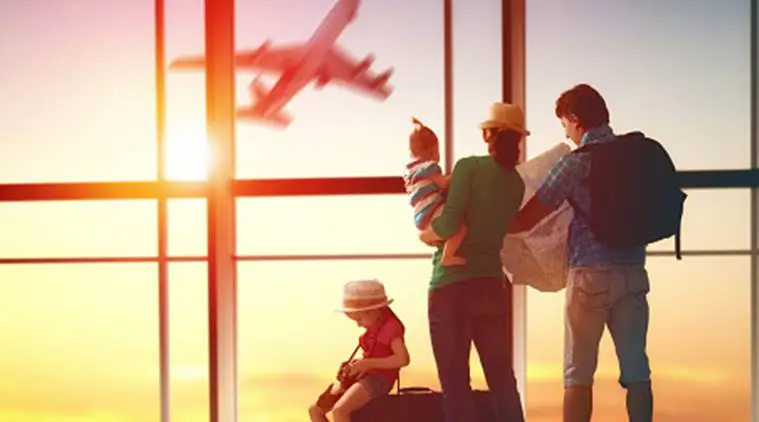- India
- International
Travelling with special needs children? This is how parents can request support from airlines
Children with intellectual disabilities like those on the autism spectrum can feel overwhelmed in unfamiliar surroundings and require special care. As a parent, how can you ensure that your child does not have to endure stress during a flight?
 DPNA: Parents can ask for special assistance from airlines when travelling with disabled children. (Source: Getty Images)
DPNA: Parents can ask for special assistance from airlines when travelling with disabled children. (Source: Getty Images)
The special assistance facility offered by airlines in India to passengers with disability or those with reduced mobility allows you to book wheelchairs prior to your scheduled flight. So, when you are booking your flight ticket, you either make a request for it at the time of booking or inform the airline at least 24-48 hours prior to departure, as per the official websites. We are, however, not just talking about physical disability. Children with intellectual disabilities like those on the autism spectrum or Down Syndrome can feel overwhelmed or uncomfortable in an unfamiliar, crowded surrounding and therefore require special care. So, as a parent, how do you ensure that your child does not have to endure any stress while travelling on a flight?
How to ask for special assistance from airlines
Next time you book a flight ticket, add the code “DPNA” in the free-text box that appears on the booking page, in case your child needs any additional support from the airline. “DPNA (disabled passenger with intellectual or developmental disability needing assistance) is a Special Service Request (SSR) code. SSR codes are used in the airline industry to communicate traveller preferences or needs to airlines. They are delivered through standardised four-letter codes defined by the International Air Transport Association (IATA),” explained Martin Herbert, Regional Managing Director for India and Sri Lanka, Travelport, the organisation that has been running an awareness campaign for DPNA.
 The DPNA code can be used for children with intellectual disabilities. (Source: Getty Images)
The DPNA code can be used for children with intellectual disabilities. (Source: Getty Images)
As mentioned by Herbert, the DPNA code, introduced in May 2008, is specifically applicable to IATA member airlines. In India, these include Air India, Vistara and SpiceJet. So, in case you want to avail the code, you will have to make your booking with the above mentioned airlines.
When can you use the DPNA code and how?
Parents can request the DPNA code through any travel agent, including online travel agencies. The code can be requested if your child has intellectual disabilities, that is, for those who have limitations in cognitive functioning, including communication, social and self-care skills. These mainly include Down Syndrome, autism and fragile X syndrome. Herbert explained, “When booking through a travel agent, this support will be submitted to the airline through the free-text box. Once the DPNA code and supporting text has been shared with the airline, it will respond to confirm the code and that the request has been registered. If you are making a booking through an online travel agency, we recommend calling the airline directly to request the DPNA code and outline the support required. This will ensure you get immediate feedback on the request.”
What kind of facilities can you avail under DPNA code?
“The support that can be delivered tends to be the small things that can make a big difference. Examples include boarding first as a family, not sitting next to babies who may cry, having the passenger’s meal served first, checking in on the passenger every couple of hours, sitting at the front of the plane so you can get off quickly, priority check-in etc,” Herbert said.

In fact, some parents are already availing special assistance from airlines via DPNA code. An Emirati vlogger Khalid Al Ameri recently shared a video on social media, documenting his travel using the DPNA code on an Etihad Airways flight with his son Abdullah, who is on the autism spectrum.
That said, it is not mandatory for the airlines to take actions as per the DPNA code. Air India’s official website, for instance, gives detailed information on wheelchair assistance but does not mention DPNA. When Express Parenting asked Praveen Bhatnagar, AGM, Air India, he said, “For a disabled passenger, one needs to add a remark in the text box at the time of the booking. The passenger has to mention the kind of assistance he or she needs, like oxygen or wheelchair. The wheelchair goes right up to the carrier. And the message is conveyed to the enroute stations too.”
For mentally challenged passengers, the Air India official site mentions that they will not be “accepted without a suitable attendant…The attendant must be briefed that no Cabin Crew will be specially assigned to look after the mentally challenged passenger.”
We also reached out to SpiceJet and Vistara but the respective spokespersons were unavailable for comments.
So, what about the other airlines in India that are not members of IATA? Among these, GoAir provides wheelchair assistance while IndiGo lists “Customer with Intellectual disability/Autism and Down syndrome” under the disabled passenger category, on its website. So, in case you need special support for your child like a comfortable seat and other facilities, you need to notify the airline at least 48 hours before departure.
In India, there are some activists who are educating people about DPNA like Merry Barua, who works for autistic children. She remarked, “We got to know about DPNA code very recently in India and I don’t think it is really followed here by the airlines in that sense. But we are trying to raise awareness about it. Secondly, a part of the operations for air travel like security check are not handled by the airlines but the CISF. We have done a lot of training with them across the country and they have been very keen on learning on how to help persons with disabilities. So, at the airport, they can help you jump the queue and take a quicker route. But there is of course the need to spread more awareness.”
The SSR code, in fact, applies to the airlines and not the airport staff, although IATA airline staff members should be aware of the code.
Tips for parents of special needs children
It is highly probable that a child with intellectual disability might exhibit unusual behaviour in a public area. And parents might feel embarrassed, stressed or irritated, and may end up scolding the child. Parents need to handle such situations with utmost sensitivity. Barua suggested the following tips for parents to keep in mind when going out in public with special needs children.
1. The child can behave in a certain way which can seem “inappropriate” to other people. But if the parent is uncomfortable with the child’s behaviour, others might all the more feel that something is wrong. The parent needs to be calm and comfort the child instead of criticising or scolding them for their behaviour because it is possible that the child may be dealing with something stressful in the environment and is trying to communicate it.
2. In situations of crisis, parents should avoid getting into a fight with others or it can worsen matters for the child.
3. Parents should not give in to any pressure from others but stand their ground to ensure their child is not discriminated against in any way.
Apr 25: Latest News
- 01
- 02
- 03
- 04
- 05








































